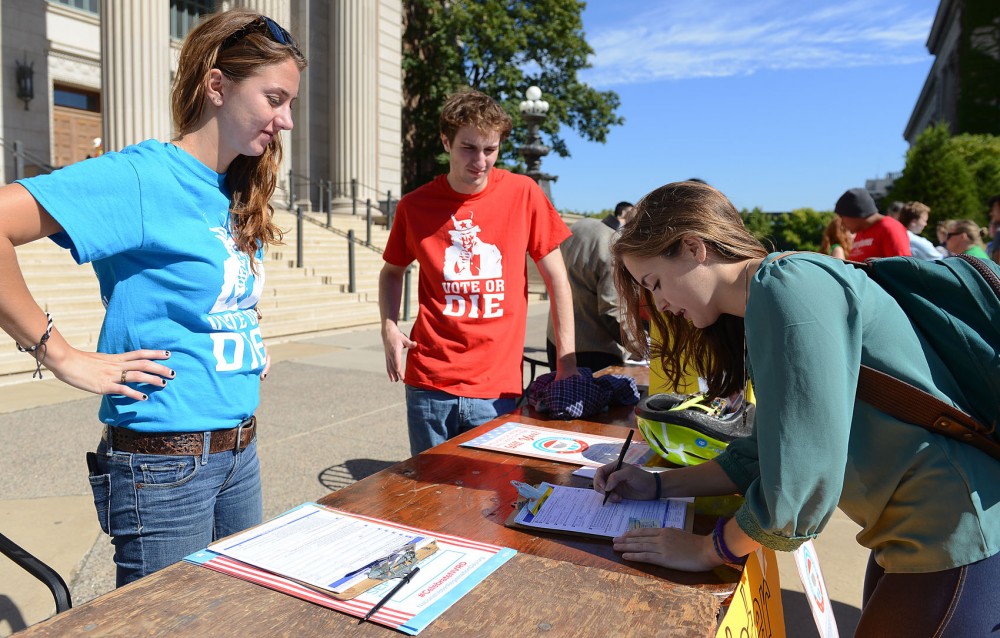More than 100 University of Minnesota students registered and pledged to vote during the campus Voterpalooza event and mayoral debate Tuesday — fewer than were registered during Voterpalooza last year.
Campaigns for Minneapolis city elections — which will be held Nov. 5 — haven’t targeted the University this year, and the second annual Voterpalooza event on Northrop Plaza was the first time some students had heard about the elections.
Speech, language and hearing sciences senior Julia Eckert said if she hadn’t stumbled upon the event, she probably wouldn’t have known there was an election this fall.
“It made me want to look into getting more information [about the candidates],” she said.
Students heard from Minneapolis mayoral and city council candidates, registered and pledged to vote and learned about ranked-choice voting as part of the event, which celebrated National Voter Registration Day.
Last year, about 350 students registered and pledged to vote at Voterpalooza, which was hosted this year by the Minnesota Public Interest Research Group, Minnesota Student Association and FairVote Minnesota.
Only seven of 35 mayoral candidates attended the event.
Those who did — Stephanie Woodruff, Cam Winton, Betsy Hodges, Bob Fine, Jackie Cherryhomes, Doug Mann and Don Samuels — stressed the importance of voting and made arguments for why students should vote for them.
DFL candidate Woodruff said students were looking to get a better sense of her campaign platform.
“I think a lot of people haven’t been paying attention yet,” she said.
Woodruff said students seemed most concerned about the education gap, which she said is the city’s “biggest crisis.”
Independent candidate Winton said students asked him a variety of questions Tuesday, like how he plans to increase jobs.
He said students also asked how he plans to improve the relationship between the University and Minneapolis police.
City Council candidate Jacob Frey also used Tuesday’s event to gain student support. Frey is looking to unseat two-term DFL incumbent Diane Hofstede to represent Ward 3, which includes parts of the University and surrounding neighborhoods.
Hofstede did not attend Tuesday’s event.
‘A very different election’
This year, 35 candidates are vying to replace Mayor R.T. Rybak, who has held the seat since 2001. The city will use ranked-choice voting, a method allowing voters to rank their top three choices for mayor on the ballot.
On Tuesday, representatives from FairVote MN, a group that advocates for ranked-choice voting, were on hand to teach students about how the voting process will play out.
“People try to pretend that this is going to be difficult. We’re going to prove them wrong,” said Mike Griffin, FairVote MN field director.
Chemical engineering freshman Nicole Olson attended the event to learn more about the system. She said she thinks ranked-choice voting is “a good way to vote.”
“It kind of makes me want to vote more,” she said.
Not as many students registered and pledged to vote as last year, but MPIRG co-chair Cora Ellenson-Myers said they aren’t comparing the two years.
MPIRG set a semester goal of 2,000 registrations and pledges to vote, she said, and has now reached more than 1,700.
“It’s a very different election than [last year’s],” she said, “but we are very happy with turnout this year.”
-Nicholas Studenski
contributed to this report.








